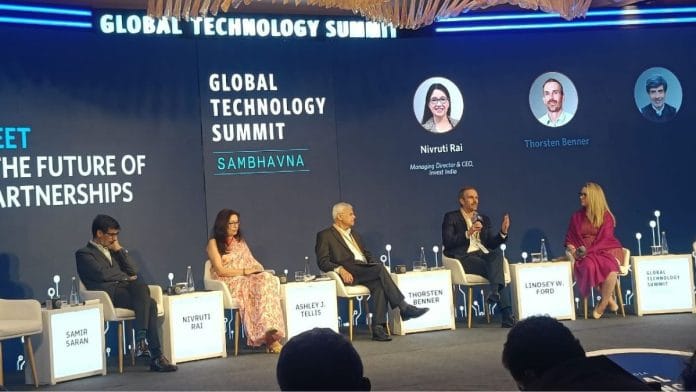New Delhi: The United States is witnessing the rise of techno-nationalism under President Donald Trump, top geo-strategic expert Ashley J. Tellis said Friday in Delhi, but underlined that “corporate America” cannot do without Indian talent.
Tellis, the Tata Chair for Strategic Affairs and senior fellow at Carnegie Endowment for International Peace, said that the US seeks to preserve and protect its technology dominance.
Speaking at the Carnegie India Global Technology Summit 2025, co-hosted by the Ministry of External Affairs, he said that the India-US tech partnership is a crucial opportunity amid a turbulent global landscape.
He pointed to the rise of techno-nationalism in the US, particularly under the Trump administration. “There is a strong streak of techno-nationalism that seeks to preserve and protect US tech dominance, to reclaim capabilities that are believed to have been lost to the world,” he said. However, he acknowledged US’ limitations, suggesting that global cooperation remains essential.
He further expressed optimism about India’s long-term role in this ecosystem. “India has an enormously talented pool of manpower that corporate America simply cannot do without. The rise of global capability centers and the growing India-US business ties are not responses to state action, but rather to market incentives.”
Tellis underscored that India will remain a vital partner as the US navigates its strategic rivalry with China.
“I don’t see India’s manpower advantages disappearing. I don’t see the United States being able to sharply increase the size of its manpower pool within the next five to ten years, which takes us naturally to a partnership with India that will be sustainable,” he said.
He added that the US is increasingly thinking of geopolitical cooperation. “China is, of course, front and centre in this cooperation… And even though our policies towards India and the rest of the world may be quite ragged in terms of how we respond to the China partnership, India figures very prominently as a partner of the United States in that relationship. So, I think at least on the US-India relationship, it is possible to be more optimistic than maybe understanding the broader trends in the US economy.”
He further said that to keep tech sustainable, it is important to “market transformations in both countries” without state intervention, if the US wants greater collaboration because the bias in the Trump administration is to “sell, sell, sell”, so India has more acquisition opportunities.
Also Read: Jaishankar hints at amending nuclear liability law as India seeks deeper ties with US
Defence ties & new avenues
In a separate session on US-India Strategic Technology Cooperation, Tellis spoke about the US’ F-35 stealth fighter jet offer to India. He said that it is a “signal of US ambition”, but that the “pace is going to be much slower than both sides would like”.
“This is increasingly driven by the fact that at the Indian end, focus is on technology, not connected to operations, at least not connected to co-op or joint op. The moment you focus on tech out of operations, the US treats it as a discreet piece on the table that leads to bureaucratic discussions on whether we should permit or not.”
He added: “In the context of tech based on what India-US is operationally going to do together, the incentive structure at the US end changes dramatically… somethings are there that India would want to do apart from operations, and we will win some and lose some, but to me, avenue for future acceleration really has to come from a different model and that model has to be…we have to do things together in ways that matter to the interest of both countries.”
He further said that the idea of space cooperation is a huge opportunity, besides the areas of defence and cyber.
“As we grow more interconnected in other areas of economy and tech, we want to make certain that whatever is lodged in India is not going to be vulnerable. In the whole question of defensive cyber, we have only tipped our toes in the water and it represents huge opportunities for us.”
ThePrint is a digital partner for Global Technology Summit 2025.
(Edited by Mannat Chugh)
Also Read: ‘Modi a friend, but India not treating us right’—What Trump said unveiling new tariff regime






